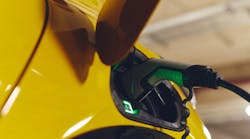NREL Joins Effort to Launch Interagency Collaboration for Build-Out of National EV Charging Network
National Renewable Energy Laboratory (NREL) researchers will contribute their expertise in electrified transportation systems to help create a new federal office focused on strategically and equitably expanding electric vehicle (EV) charging infrastructure throughout the United States.
The Joint Office of Energy and Transportation (Joint Office) is an interagency collaboration between the U.S. Department of Energy (DOE) and the U.S. Department of Transportation (DOT) that will support a nationwide effort to develop the infrastructure necessary for widespread EV adoption. The directive to establish the Joint Office comes from the Infrastructure Investment and Jobs Act (IIJA), which provides up to US$7.5 billion to deploy a national EV charging network with a focus on corridors and communities, filling gaps in rural, disadvantaged, and hard-to-reach locations.
"The Joint Office is the catalyst for enabling transportation electrification in the United States, as well as more broadly supporting the decarbonization of transportation infrastructure," said NREL's Alex Schroeder, a manager in the Center for Integrated Mobility Sciences and interim executive lead for the Joint Office. "This is a multi-agency effort to combine capabilities, engage stakeholders, and ensure the best ideas are brought forward."
NREL's Johanna Levene, Stephen Lommele, Matthew Moniot, and Lissa Myers will join Schroeder to work with DOE and DOT in the launch of the new office. Researchers from Idaho National Laboratory and DOT's Volpe Center are also collaborating on the launch.
"Our knowledge of EV charging stations makes us an absolutely critical piece in this effort," said Levene, another group manager in NREL's Center for Integrated Mobility Sciences. Levene leads the team that manages the Alternative Fuels Data Center (AFDC), which houses the Alternative Fueling Station Locator, a mapping tool that helps drivers find public EV charging stations and alternative fueling infrastructure throughout the United States and Canada.
The Joint Office will support state-level efforts to install, operate, and maintain EV infrastructure as part of the Biden administration's goal to facilitate a national network of up to 500,000 EV chargers. NREL researchers estimated a network of that size could provide charging for tens of millions of EVs along highway corridors and within communities.
"There are many different ways a successful charging network could be deployed," said Eric Wood who, along with Moniot, led NREL's analysis using the Electric Vehicle Infrastructure – Projection (EVI-Pro) tool to aid in evaluating options for developing a nationwide charging network. "We can consider all the different ways people use charging infrastructure — at home, work, while shopping, on long-distance road trips — and suggest a mix of fast and slow chargers that is appropriate and convenient for drivers."
The Joint Office will provide coordination for a national charging network, as well as to help develop guidance and requirements for charging infrastructure to help ensure the network is accessible to all EV drivers. Researchers from DOE, DOT, and national laboratories, in collaboration with stakeholders, will provide technical assistance, including state plan guidance and review, tools and resources, and best practices for incorporating equity considerations. The office will also provide guidance and resources for workforce training and certification to fill the jobs necessary to install and maintain the charging infrastructure.
"States have expressed interest in having access to experts who have been working on this for years to help with this effort. Our team has extensive experience working with data through the AFDC and working with networks of people through Clean Cities coalitions," Levene said. "Integrating those two pieces together is critical to address the real problems that exist in our communities."
Connections with NREL and other national labs will allow states to access research capabilities, modeling expertise, and experience in training and community outreach. For example, Myers brings first-hand experience incorporating EVs into NREL's intelligent campus by installing more than 100 EV chargers and integrating smart charge management.
Technical assistance provided through the Joint Office is expected to vary and change over time as state needs evolve throughout the infrastructure buildout process.
"We want to empower states to build charging infrastructure that culminates in a convenient, reliable, affordable, accessible, and equitable national network for EV charging," said Lommele, an NREL project leader who currently supports Technology Integration for the Vehicle Technologies Office in DOE's Office of Energy Efficiency and Renewable Energy. "This network will inspire public confidence in finding reliable charging to make driving or riding in an EV an easy choice for everyone."
The IIJA funding to build out a publicly accessible charging network across the United States is the largest public investment in EV charging.
"This is the backbone upon which future charging infrastructure will be built," Schroeder said. "It's creating a national network so all Americans can drive electric and is a unifying investment in the future of transportation."
Learn more about the Joint Office of Energy and Transportation and NREL's transportation and mobility research.


